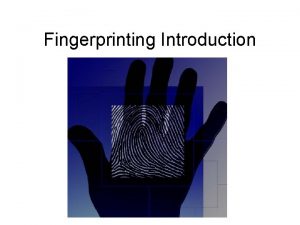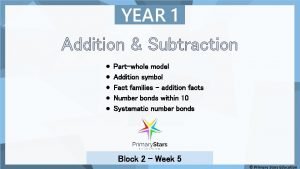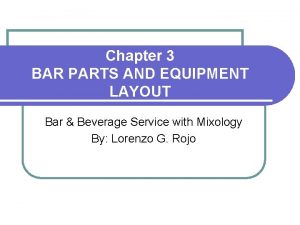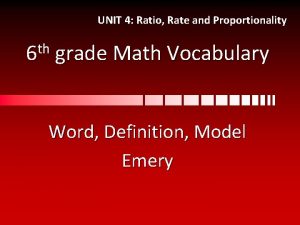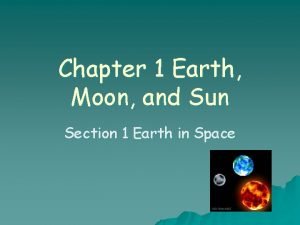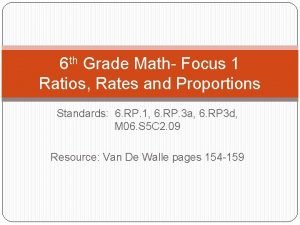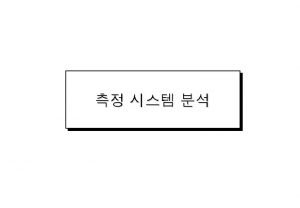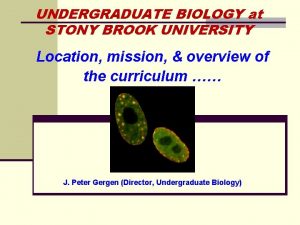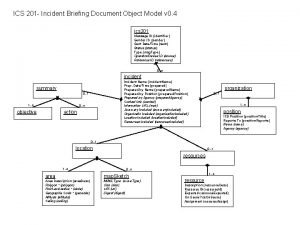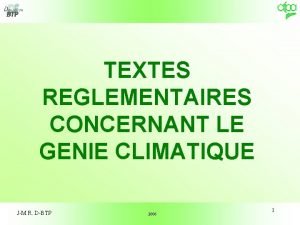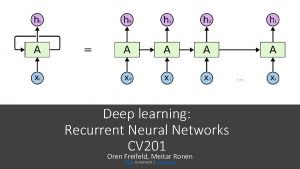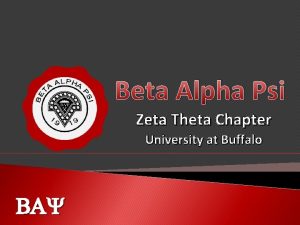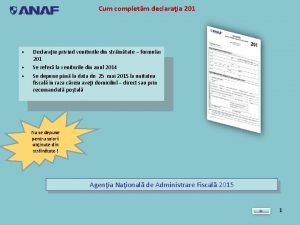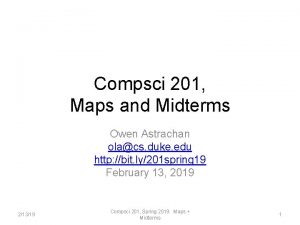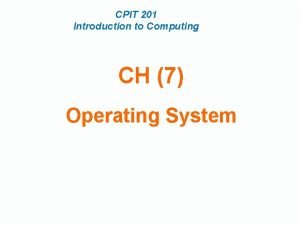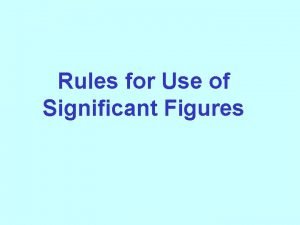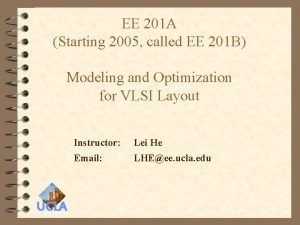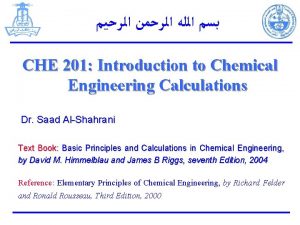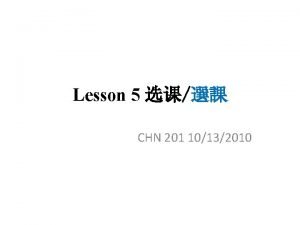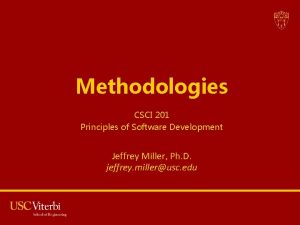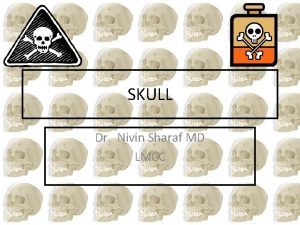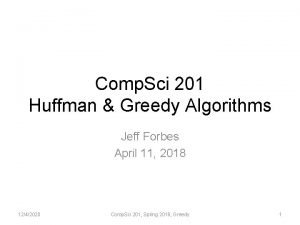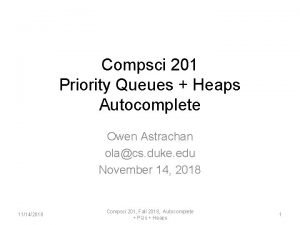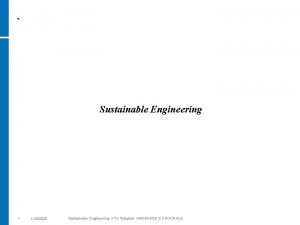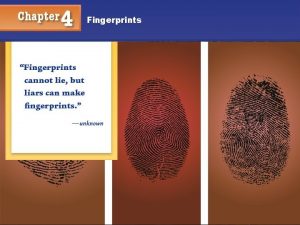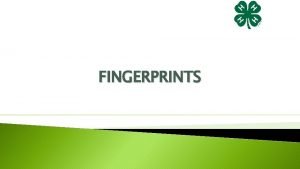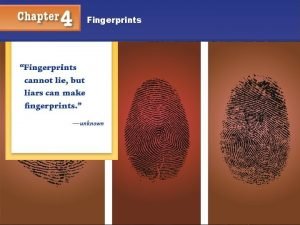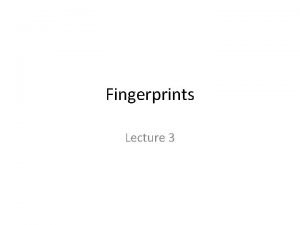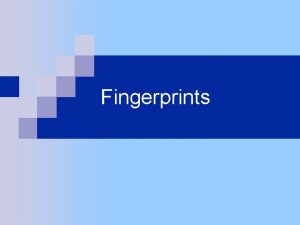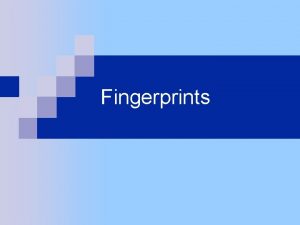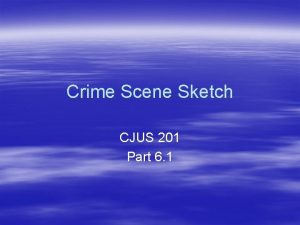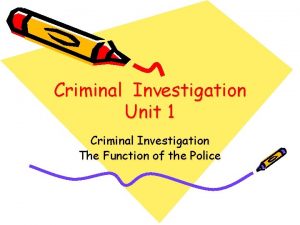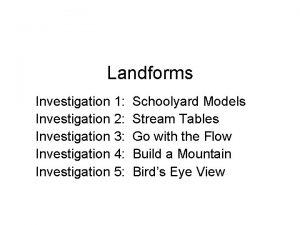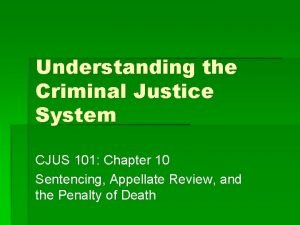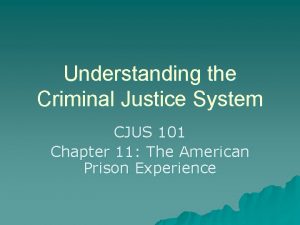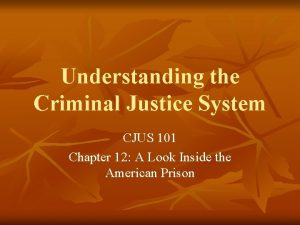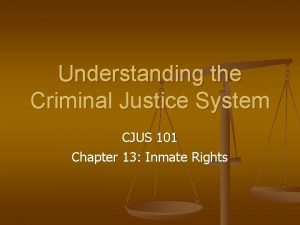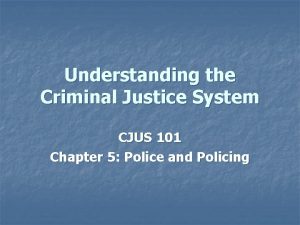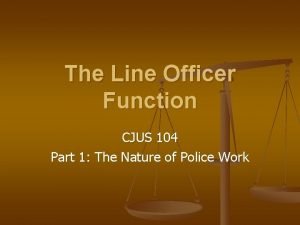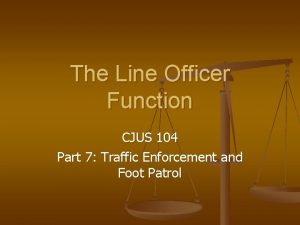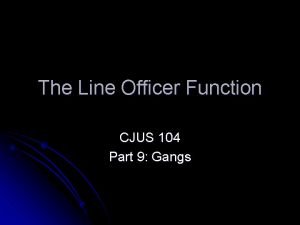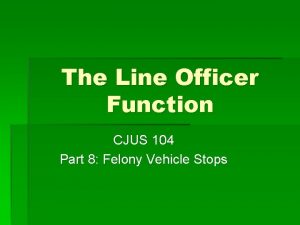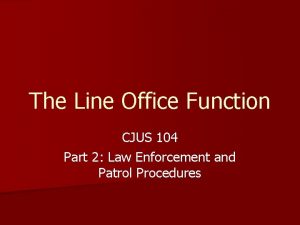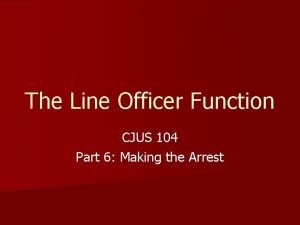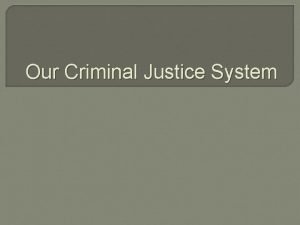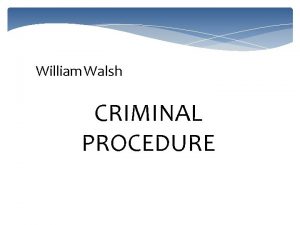Criminal Investigation CJUS 201 Fingerprints Part 12 Fingerprints

































- Slides: 33

Criminal Investigation CJUS 201 Fingerprints Part 12

Fingerprints 1. Friction ridge skin - hands: fingers, palms - feet: toes, soles, heels a. Side opposite fingernail: “bulb” - friction ridge outlines b. Two layers of skin - inner / outer (1) Epidermis

Prints, cont. - contains ridges - 2 mm thick (2) Dermis - demal papillar - origination - scars / disease c. Uses (1) Friction ridges

Prints, cont. - leaves impression - body secretions - material touched (2) Identification - permanent / individual - form on fetus (3) Hands / feet means to ID - fingers routinely used

Prints, cont. 2. Prints - exact impression / image a. Most common means - perspiration - 99% water (1) Oils / chemicals - 1% amino acids / salts (2) Outside contaminants

Prints, cont. b. Types of surface (1) Nonporous - most productive (2) Porous - chemical treatment (3) Plastic - photograph - cannot be developed

Prints, cont. c. Impression - friction ridges - inside of fingers (1) Transferred - deposit of perspiration (2) Duplicated - by this - other substances

Prints, cont. 3. Files maintained - sole purpose a. Arrest - WASIC - NCIC b. State requirements - employment - driver’s license - certificates

Prints, cont. c. Professional license - health care - construction - accounting - education d. Military service - enlisted / civilian 4. Types of prints - visible / latent / plastic

Types, cont. a. Latent prints - law enforcement - crime scene (1) Process - detecting / raising / lifting (2) Term - invisible - fingertips - secretions / contaminants

Types, cont. b. Two sources of materials - natural / environmental (1) Natural - perspiration - body residue (acids / fats / salts) (2) Environmental - foreign matter - dust / soot / pollen / cooking oils

Types, cont. c. Personal factors - print left or not (1) Physiology - perspire? (2) Surface type - suitable - unpainted wood / paper / textured - glass / enamel / metal / glossy

Types, cont. (3) Pressure - firm / not heavy - ridges light - distort detail 5. Fingerprint classification - three primary patterns (types) a. Arch - ridges enter one side - rise / curve in center

Classification, cont. - flow out opposite side (1) Plain / tinted (2) 5% – 10% b. Loop - enter on either side - make loop - flow out opposite side - same side

Classification, cont. (1) Plain / double loop / central pocket loop / accidental (2) 60% - 65% c. Whorl - enter on both sides - form circle - flow out opposite side (1) 25% - 30%

Classification, cont. 6. Fingerprint patterns - used to classify - not individualize a. Counted: core to delta - points of distinction - necessary for ID (1) France = 17 (2) England = 16

Patterns, cont. (3) Spain = 10 to 12 (4) United States = 12 (5) Washington State = 12 b. Evidentiary value - crime scene - victim - person identified

Patterns, cont. 7. Methods of classifying - mathematical formula - shapes / position / size a. Characteristics - unique properties in ridge detail - different from each other - different from one another b. Types - ending ridge

Methods, cont. - bifurcation - dot - short ridge - island (enclosure) c. FBI: catalog of prints - NCIC (1) Taken in US (2) Vary: state to state

Methods, cont. d. Collection: two purposes - evidence of patterns - positive identification 8. Lifting of fingerprints a. Dusting - specific steps (1) Brush is clean

Lifting, cont. - roll handle (2) Shake powder - loosen (3) Apply lightly - follow contour lines (4) Remove excess (5) Photograph

Lifting, cont. b. Lifting - commercial lift card (1) White / black background - color of powder - rubber lifter (2) Transparent tape - different sizes - palm size

Lifting, cont. c. Transfer to card - identification 9. Chemical development - paper / cardboard / unpainted wood a. Iodine method - crystal fumes - absorbed by oils - yellowish/brown print (fade) - will fade / photograph immediately

Development, cont. b. Ninhydrin - organic chemical - amino acids / protein (1) Kept 2 hours: room temperature - 1 to 3 days to fully develop (2) Purple-colored print - photograph immediately c. Silver nitrate

Development, cont. - sodium chloride - perspiration - organic material (1) Reddish-brown - disappear 2 hours (2) Ultra-violet light - photograph immediately d. Cyanoacrylate fuming

Development, cont. - esters / resins - “super glue” (1) Fuming chambers - vehicles - pads opened / placed (2) Non-porous surfaces - photographed - dusted - alter other biological evidence

Development, cont. e. Radiation - raises prints (1) Ultraviolet rays - shows prints - dusted (2) Laser - vitamins in perspiration - skin / paper products

Fingerprint Systems 1. AFIS - Automated Fingerprint Identification Sys. a. Technicians - digitize information - inkless prints - scanned - electronic image - stored in data base - access: NCIS / WASIC

Systems, cont. b. Suspect print - classified (arch / loop / whorl / etc. ) - 12 matching characteristics - data base computer (1) Produce comparisons - several matches - technician examines (2) Scan 1 million in 4. 5 minutes

Systems, cont. 2. Assessing surface - three types a. Non-Porous - glass / plastic / polished metal - finished wood / processes paper (1) Textured - photograph (2) Smooth

Surface, cont. (3) Curvature b. Porous - paper / wood / some painted surfaces (1) Chemical - photograph (2) Fluoresce - photograph

Surface, cont. c. Plastic - putty / plastics / adhesives - paint (semi-hardened) / plaster (1) Photograph 3. Rolling prints - from ‘V’ outward a. Right hand - thumb = 1

Rolling, cont. - index = 2 - middle = 3 - ring = 4 - little = 5 b. Left hand - thumb = 6 - index = 7 - middle = 8 - ring = 9 - little = 10
 Criminal investigation lesson plans
Criminal investigation lesson plans A plain arch is the simplest of all fingerprint patterns.
A plain arch is the simplest of all fingerprint patterns. Part whole model subtraction
Part whole model subtraction Bardie and speed rail are part of front bar
Bardie and speed rail are part of front bar Part to part ratio definition
Part to part ratio definition The part of a shadow surrounding the darkest part
The part of a shadow surrounding the darkest part Part part whole
Part part whole 미니탭 gage r&r 해석
미니탭 gage r&r 해석 What is a technical description?
What is a technical description? Stony brook biology major
Stony brook biology major Ics 201 example
Ics 201 example English 201
English 201 Nf p 40-201
Nf p 40-201 Se 201
Se 201 Cv 201
Cv 201 Beta alpha psi ub
Beta alpha psi ub Class of 201
Class of 201 Declaratia 201
Declaratia 201 Compsci 201
Compsci 201 Cpit 201
Cpit 201 How many sig figs in 3400
How many sig figs in 3400 Ee 201
Ee 201 Che 201
Che 201 Chn-201
Chn-201 Copy toon 201
Copy toon 201 Csci 201
Csci 201 7:30
7:30 Business reports ppt
Business reports ppt Glabelloalveolar line
Glabelloalveolar line 5 c.f.r. § 2640.201(a)
5 c.f.r. § 2640.201(a) Afi 34-201
Afi 34-201 Sci 201
Sci 201 Duke cs 201
Duke cs 201 Ktu sustainable engineering syllabus
Ktu sustainable engineering syllabus

